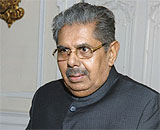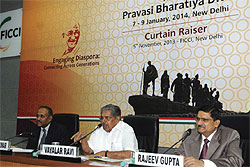|
Interview with Mr Vayalar Ravi
Minister for Overseas Indian Affairs
|
|
“The
diaspora feels they have
someone to look after them”
|
|

Mr Vayalar Ravi, Minister for Overseas Indian Affairs
|
|
Mr Vayalar Ravi has been in charge of the Ministry of Overseas Indian Affairs since
January 2006. Apart from the Prime Minister, he probably has had the longest stint
among those in the Union Cabinet in any single Ministry run by the UPA Government.
Vastly travelled and widely known, Mr Ravi’s forte has been his ability to make friends
among both the newer generation of immigrants such as those in the Gulf, North
America, Europe and the Asia Pacific as well as those who are from the older diaspora,
such as the ones in Mauritius, Fiji, Trinidad and Tobago, Guyana, Suriname, the French
West Indies, Malaysia, South Africa and Singapore. He’s presided over a Ministry that is
still quite new and has the task of engaging with 25 million overseas Indians, scattered
across over 140 countries. The job is tough as this heterogenous and diverse group has
different aspirations from India. Mr Ravi has built several legacies that will serve the
Ministry well in times to come. He spoke to Sayantan Chakravarty, India Empire’s
Editor and Publisher, at his office on January 1, 2014.
|
|
You have completed more than eight years in this Ministry. It is a record for any cabinet minister in the UPA Government to hold any single Ministry for this long…
(Smiles…) Oh, that is quite interesting but I really do not make such calculations. But let me tell you that I’ve been given additional charge of other ministries. That is a fact.
What is that one single achievement that you’d like to highlight…
In one sentence, I’ve made the diaspora feel that there is a ministry to look after them. They now have faith in the Government of India. That is why they are regularly in touch with me. They feel the ministry is truly for overseas Indians.
Another one is that I gave them a sense of Indian identity by introducing the OCI cards. That you could say is one of the major initiatives, to give them an Indian identity. It is a success, the numbers would testify. Whenever OCI card holders need help, no matter which part of the world they are in, the ministry responds within 24 hours.
 You’ve overseen a record number of PBDs. What are the significant takeaways from the event? You’ve overseen a record number of PBDs. What are the significant takeaways from the event?
It provides overseas Indians an opportunity to get together. They can talk together. They can talk to the Government. They can discuss their aspirations, their expectations, ventilate their problems. One of the issues that I’ve been able to deal with strongly is that of unscrupulous agents who have cheated many people by luring them away to foreign lands, especially the Gulf. We first started our campaign against them by issuing advertisements. Personally I would warn people against the misleading agents at every meeting I attended, every platform I spoke, whether in India or overseas. I even threatened to prosecute them. Today I can safely say that the problem has come down drastically from a few years ago.
How about the issue of voting rights for NRIs?
Let me tell you that one day at a get-together, one man told me that even though he has an Indian passport, he is not an Indian. When I asked him why, he said that he couldn’t vote in India, and that in itself made him feel like an outsider. That sentence provoked me. I took a decision to resolve the issue. I moved cabinet, got the matter of voting rights passed. Amendments were made to the law. You could say that it is another significant achievement. Now when in India, NRIs or Indian passport holders can vote. We cannot turn it into a postal ballot, because thousands of cases will land up in courtrooms. Now the voting rights accorded to NRIs have made them feel confident about our Ministry. This has been a big helping hand.
What about the recent issues in Saudi Arabia?
The relations between India and Saudi Arabia remain cordial. Indians who were made to return carried wrong documents. But we dealt with the issue in a way that now the Saudi Arabian Government knows that agents can cheat and our expatriates can be stranded without proper papers. The onus is also on them to check this mischief by unscrupulous agents. It is no longer a major issue.
You have signed a large number of social security agreements…
Yes, these are to help our workers who go overseas. They should be aware of the social security measures that have been agreed upon. Their employment terms must fall under the framework of such agreements. If there is a violation and a complaint is made before us, we’ll move through proper channels to ensure that the employer goes by the rules.
One of the issues that was majorly stirred up two years ago related to Indian students in Australia. How is the situation today?
Things are now back to normal. Students are going back to Australian colleges and universities and enrolling for different programmes. Now we have ways and means to protect their interest. At the same time we’ve told the Australian Government that they must check agents who are exploiting the students. Issues related to students are always sensitive, and must be handled carefully.
What is your message for the diaspora?
The message is that they should feel close to India. Here’s a Government, here’s a Ministry that wants them to feel close. At the same time they should go along with the system in the country of their domicile and stay within legal frameworks. When you are legal, you are
protected.
|
|
|
|
January 2014
|
|


|
|
|
|